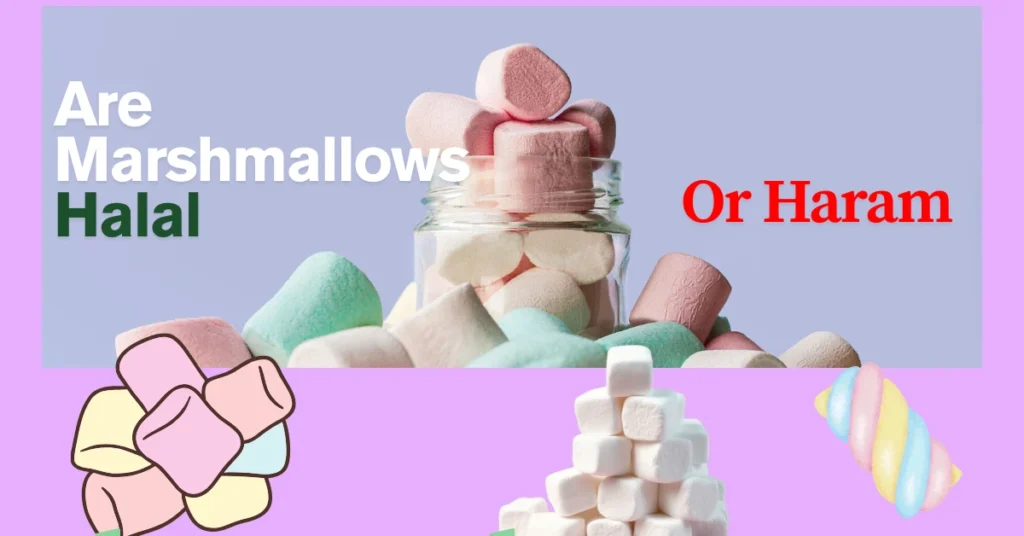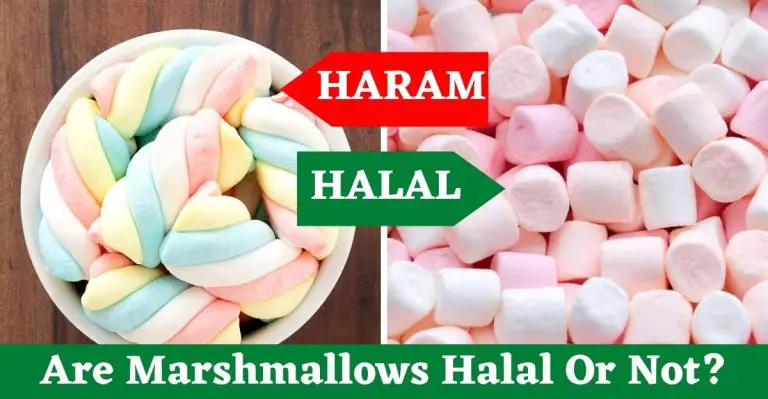Are Marshmallows Halal: We all know and love marshmallows – they’re sweet, fluffy, and perfect for topping off a hot chocolate or more. But are Marshmallows Halal? Let’s examine it more closely.
The question Are Marshmallows Halal has perplexed a lot of people due to varying ingredients and manufacturing processes. Some say that because marshmallows are made with gelatin, which is derived from pork, they are not halal. Are Marshmallows Halal? Others argue that since the source of gelatin is not explicitly mentioned on the packaging, it can be considered halal.
So, what’s the final word on the common query Are Marshmallows Halal or Not? In this blog post, we will discuss which type of marshmallows are halal and the presence of which ingredients makes it haram.
Are Marshmallows Halal Or Haram?
If Marshmallows are made with pig gelatin, then they are not considered to be halal. Gelatin is a protein that is derived from animal collagen, and it is not permitted for consumption by Muslims if it is derived from pigs or animals slaughtered in the haram way.
However, if the marshmallows are made with plant-based ingredients (carrageenan, agar-agar), fish-based gelatin, or animals slaughtered in a halal manner, then they are considered to be halal.
What Makes Marshmallow Halal or Haram?
Marshmallows are a type of confectionery that is typically made from sugar, corn syrup, gelatin, and flavorings. The question of ‘Are marshmallows halal or haram’ depends on the kind of gelatin that is used in their making.
Are Marshmallows Halal? If they contain gelatin derived from pigs or animals slaughtered in a haram manner, then they are not halal. However, if marshmallows are made with plant-based ingredients, fish-based gelatin, or gelatin from animals slaughtered in a halal manner, then they are halal.
As a result, it’s crucial to review the marshmallows’ ingredients before buying them.So, that you can get to know whether marshmallow is halal or not.
How Are The Halal Marshmallows Made?
The components used to make halal marshmallows comply with Islamic dietary regulations. Gelatin, a substance used to make traditional marshmallows, is typically produced from animal products, frequently pork. Halal gelatin, made from cow proteins rather than pig ones, is acceptable for consumption by Muslims.
Gelatin, a vital component that gives marshmallows their fluffy texture, is an essential component. The gelatin used to make non-halal marshmallows comes from pigs or other animals that were killed according to haram practices.
- In halal marshmallows, gelatin is swapped out for a halal-acceptable equivalent such as agar-agar, a seaweed-based gelatin substitute, carrageenan, or another plant-based substitute.
- In a sizable mixing dish or kettle, combine sugar, water, and the gelatin alternative to make the marshmallow mixture. The components are then fully dissolved in this mixture by heating it.
The simple ingredients for halal marshmallows are as follows:
- One water cup
- Gelatin (3 tablespoons)
- Sugar, two cups
- Corn syrup, one cup
- 1 Tablespoon vanilla extract and 1/4 teaspoon salt
- Granulated sugar
Halal marshmallows also contain carrageenan, which gives them their distinctive texture and aids in maintaining their shape. Carrageenan is normally used in tiny doses and the amount used in halal marshmallows depends on the desired texture. Since carrageenan is regarded as halal, it is acceptable in halal marshmallows.
The flavor of the marshmallows can be improved by adding flavorings like vanilla essence or other natural flavors. To achieve various colors, coloring chemicals both natural and artificial may also be applied.
It's vital to remember that different brands and manufacturers may have different manufacturing processes. It is therefore always advised to examine the product package or get in touch with the producer directly to make sure the marshmallows are halal-certified and adhere to your dietary needs.

Forming of Halal Marshmallows
The formation of halal marshmallows involves several steps and ingredients. A solution of boiled dissolved sugar and corn syrup forms the base of the marshmallow mixture.
Halal marshmallows are made using gelatin derived from halal sources, such as chicken or cow. Alternatively, whipped egg whites can be used as a substitute for gelatin.
Gelatin is a protein that is derived from animal collagen, and in the case of halal marshmallows, it is sourced from cow proteins instead of pork. This small step of using gelatin from halal sources makes a significant difference for Muslims who follow halal dietary guidelines.
Emulsifying agents, such as fat and gum, are added to the marshmallow mixture. These agents help maintain fat distribution and provide the aeration that makes marshmallows fluffy.
Cooling the Halal Marshmallows
The marshmallow mixture undergoes a shaping process after being made and molded. The mixture may then be extruded through nozzles or placed on a conveyor belt to produce the marshmallows in the required shapes.
The marshmallows go via a cooling belt after being produced. The cooling belt assists in bringing the marshmallows’ temperature down and solidifying them. For the marshmallows to keep their texture and shape, this step is essential.
The starch powder is applied to the cooling belt before the marshmallows get to the cutter. This absorbs any extra moisture from the bottom of the marshmallow mixture and aids in preventing the marshmallows from sticking to the belt.
Packaging the Halal Marshmallows
The marshmallows are weighed to ensure uniform serving sizes once they have cooled and crystallized. Food-grade packaging materials that are suitable for eating and maintaining the product’s freshness are commonly used to package halal marshmallows.
The marshmallows’ quality and shelf life are guaranteed by the packaging’s seal, which guards them against pollutants, moisture, and air. Additionally, it is labeled with pertinent information, like the name of the company, the name of the product, the ingredients, the nutritional facts, and any halal certification or emblems.
Before being delivered, packaged halal marshmallows are put through quality control inspections to make sure they adhere to specifications and are suitable for consumption.
Why Is Gelatin Used In Marshmallows?
Gelatin is a colorless and flavourless substance that is derived from collagen, a protein found in connective tissue. When gelatin is dissolved in hot water, it forms a thick, viscous solution. This solution can then be cooled to form a solid gel.
Gelatin is often used as a thickening or gelling agent in food preparations. marshmallows are made with gelatin because it helps to give the confection its unique texture. The gelatin helps to trap air bubbles, which gives marshmallows their characteristic light and fluffy texture.
Gelatin also gives food a smooth texture and keeps marshmallows from clinging to one another. Marshmallows that are made without gelatin can be very hard and grainy.
For this reason, gelatin is an essential ingredient in marshmallow production. without it, these popular treats would be quite different-and far less delicious!
Does this solve many Muslim queries are marshmallows halal in this article? Read further to know what the ingredients used in marshmallows are to figure out whether Are Marshmallows Halal.
Ingredients Used In Marshmallows
If you’re still wondering Are Marshmallows Halal, know that plant-based or halal-certified animal gelatins make them permissible for Muslims.
- Sugar/ Dextrose
- Corn syrup
- Gelatin
- Starch
- Eggs
- Water
- Air
- Artificial Flavors include Vanilla, Strawberry, Orange, Peach, Apple
Do Marshmallows Have Pig Fat?
Many people believe that marshmallows contain pig fat, but this is not the case. Sugar, corn syrup, gelatin, and water are the main ingredients used to make marshmallows. There is no pig fat in the protein gelatin, which is obtained from the collagen of animals.
Collagen is found in connective tissues, such as skin and tendons, and it helps to give marshmallows their squishy texture. While some companies do use pork-derived gelatin in their products, there are many vegetarian and kosher alternatives available.
Some Halal Marshmallow Brands
One should check the product label on its packaging before purchasing a product to know if it is halal or not. Avoid using kosher products because they are generally made from pork.
If you’re seeking answers to Are Marshmallows Halal, here are some brands that offer halal-certified options:
1. Ziyad Gourmet Halal Marshmallow
2. Campfire Marshmallows
3. Sephra Pink and White Mini Marshmallows
4. Dandies Marshmallows
5. Trader’s Joe Marshmallows
The above brands sell halal-certified marshmallows and can be used by Muslims for consumption. we hope you are satisfied with the answer ‘Are Marshmallows Halal’ in this article.
Frequently Asked Questions
Q1: Do All Marshmallows Have Pork Gelatin?
Ans- Although marshmallows are often thought of as being vegetarian-friendly, most contain pork gelatin. Gelatin is a protein that is made by boiling the skin, bones, and connective tissue of animals. It is used in marshmallows to give them their distinctive fluffy texture.
Q2: Is Gelatin Haram Or Halal?
Ans- A type of protein called gelatin is made from the collagen found in animal skin and bones. In food, medicine, and cosmetics, it is frequently used as a gelling agent.
While gelatin is not inherently haram (forbidden), it can become haram if it is sourced from an animal whose consumption is prohibited or has been slaughtered in a way that does not adhere to Islamic law.
Q3: Are Jet-Puffed Marshmallows Haram?
Ans- Yes, Jet-Puffed marshmallows contain gelatin, which is derived from pig skin. They are therefore not regarded as halal, or acceptable for consumption by Muslims.
Conclusion
So, Are Marshmallows Halal? It depends on the ingredients. Halal marshmallows are made with ingredients that comply with Islamic law. If the gelatin used is beef-based, plant-based, or fish-based, then they are certainly halal, otherwise not.
Halal marshmallows are available for those looking for a certified product. If you’re looking for a halal version of everyone’s favorite campfire treat, there are plenty of options on the market. Always check the ingredients used to determine the halal nature of products. Or you can also check if they are halal-certified or not.

